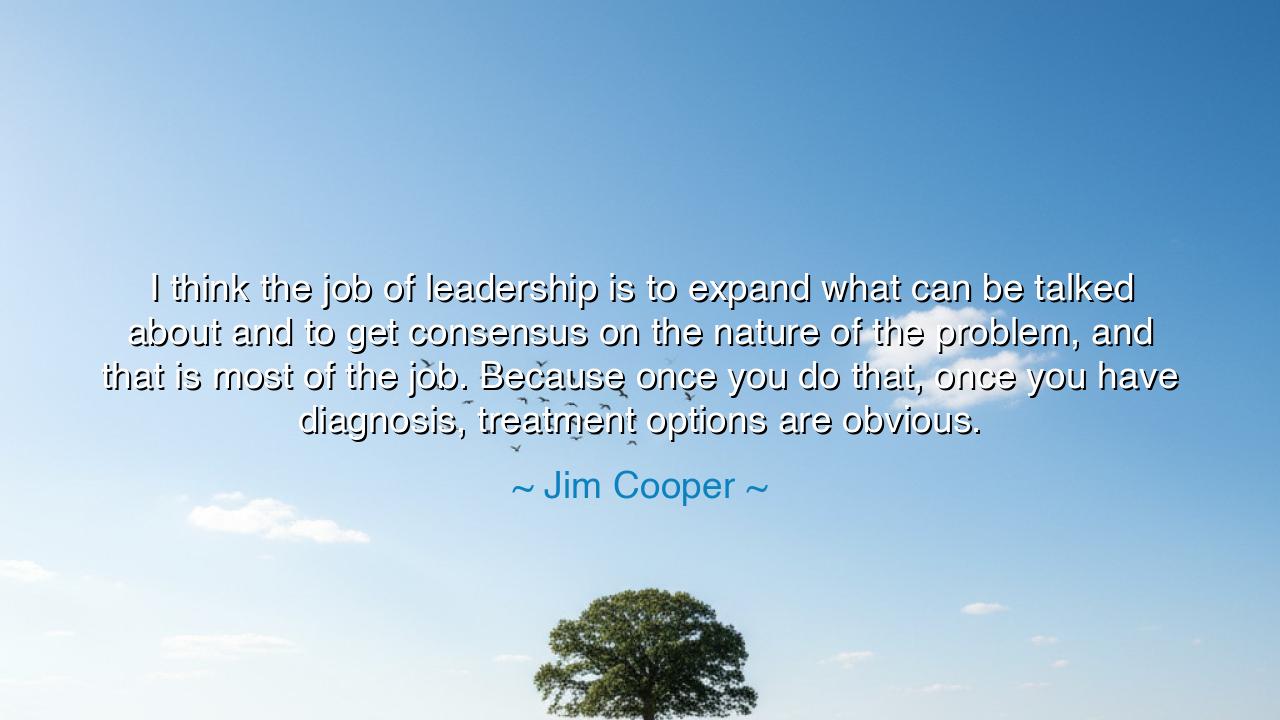
I think the job of leadership is to expand what can be talked
I think the job of leadership is to expand what can be talked about and to get consensus on the nature of the problem, and that is most of the job. Because once you do that, once you have diagnosis, treatment options are obvious.






Hear now the wisdom of Jim Cooper, who declared: “I think the job of leadership is to expand what can be talked about and to get consensus on the nature of the problem, and that is most of the job. Because once you do that, once you have diagnosis, treatment options are obvious.” In this utterance lies not only counsel for rulers and governors, but for all who bear the mantle of guiding others—whether a household, a community, or a nation. He speaks of the sacred duty of leaders: not first to prescribe remedies, but to awaken eyes to the true wound, to bring forth clarity where confusion reigns.
The ancients knew this well. For what is a leader, if not the physician of the body politic? A doctor cannot heal what he has not named. Likewise, a ruler cannot save a people until he has revealed the nature of their plight. To expand what can be talked about is to break the chains of silence, to tear down the walls of denial, and to summon forth truths that others fear to speak. For only when truth is spoken does healing begin.
Consider the tale of Abraham Lincoln in the days before the American Civil War. Many leaders of his time sought to avoid the subject of slavery, to cover it with polite silence, or to pretend it was not the nation’s mortal wound. Yet Lincoln, with the courage of a true leader, expanded what could be talked about. He named the problem for what it was—a violation of the very creed of liberty. Once the diagnosis was laid bare before the people, the path of treatment, though costly in blood, became clear. Lincoln’s legacy is proof that naming the illness is the beginning of salvation.
So too does history remind us of the failure of leaders who refused this duty. In the final days of the Roman Empire, the Senate quarreled about luxuries while barbarians pressed at the gates. No consensus on the nature of the problem could be found, for pride and denial clouded their sight. The treatment was not hidden—it was obvious: strengthen the defenses, restore discipline, renew the spirit of Rome. Yet because they failed to name their true affliction, their remedies were weak, and their empire crumbled into dust.
Thus, Cooper’s words rise with urgency: leadership is not first about the sword, nor even about the law—it is about diagnosis. To sit with the people, to listen, to uncover, to bring forth clarity of thought—this is most of the labor. Once a community knows its true ailment, the cure, however hard, shines plainly before them. Just as a sick man who knows his disease may endure the bitter medicine for the sake of health, so too can a nation, once the truth is agreed upon, bear the trials of renewal.
The lesson, my children, is this: do not seek leaders who promise remedies before they have revealed the truth of the wound. Instead, honor those who dare to expand the circle of speech, who call forth difficult conversations, who are unafraid to wrestle with the root of the matter. For these are the leaders who will guide wisely, not with illusion but with truth. And in your own life, when you lead others—be it a family, a team, or a community—remember that the greater part of your task is not to rush to solutions, but to discern together the true nature of the problem.
Therefore, let each of you take up this charge: in your homes, in your work, in your friendships, expand what may be spoken. Do not fear hard conversations. Seek consensus not on shallow appearances, but on the deeper truth beneath. Once you and your companions see the heart of the matter, the way forward will stand open before you, shining like a path after storm-clouds break. In this, you will not only solve problems—you will become the kind of leader whose wisdom endures through the ages.






AAdministratorAdministrator
Welcome, honored guests. Please leave a comment, we will respond soon